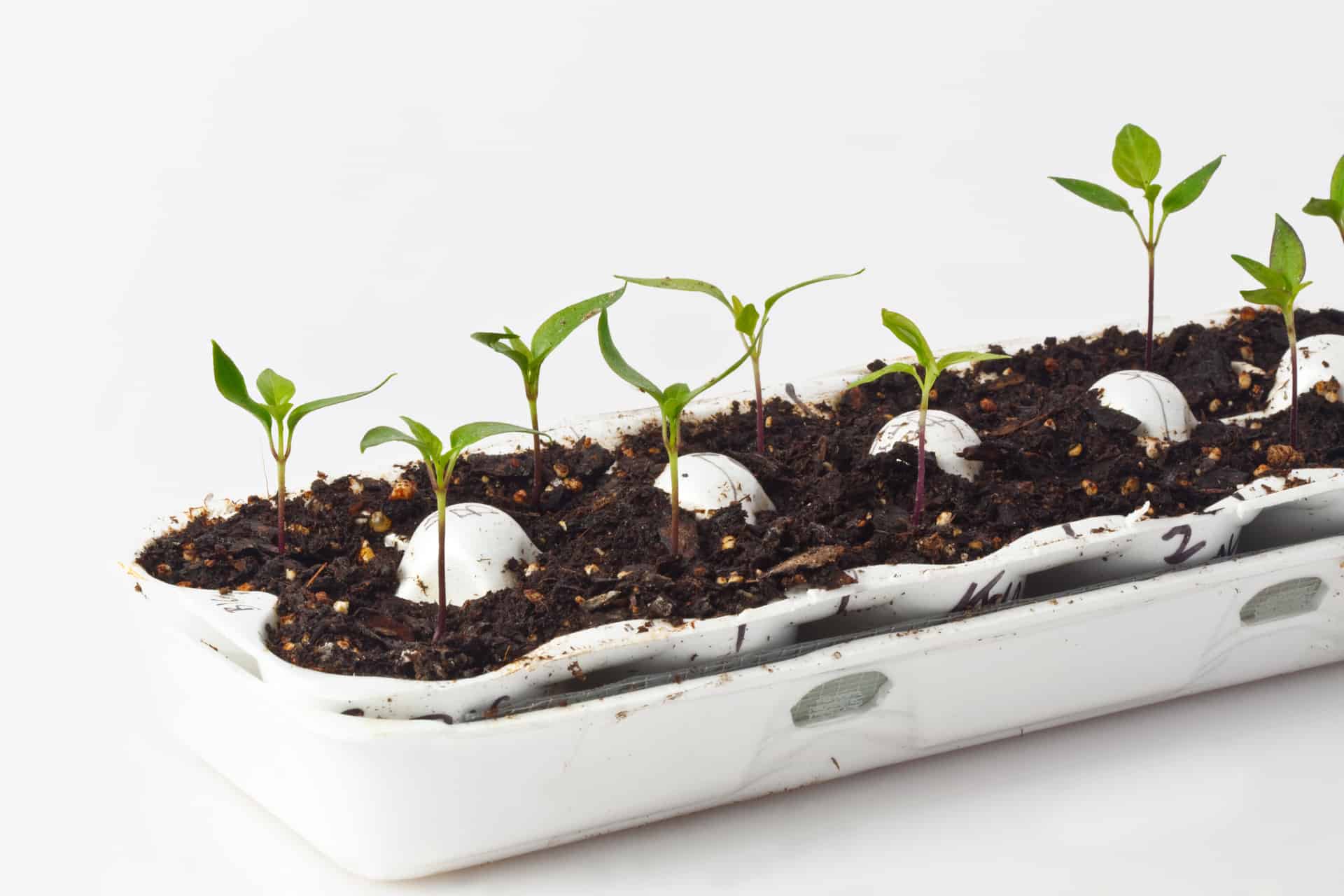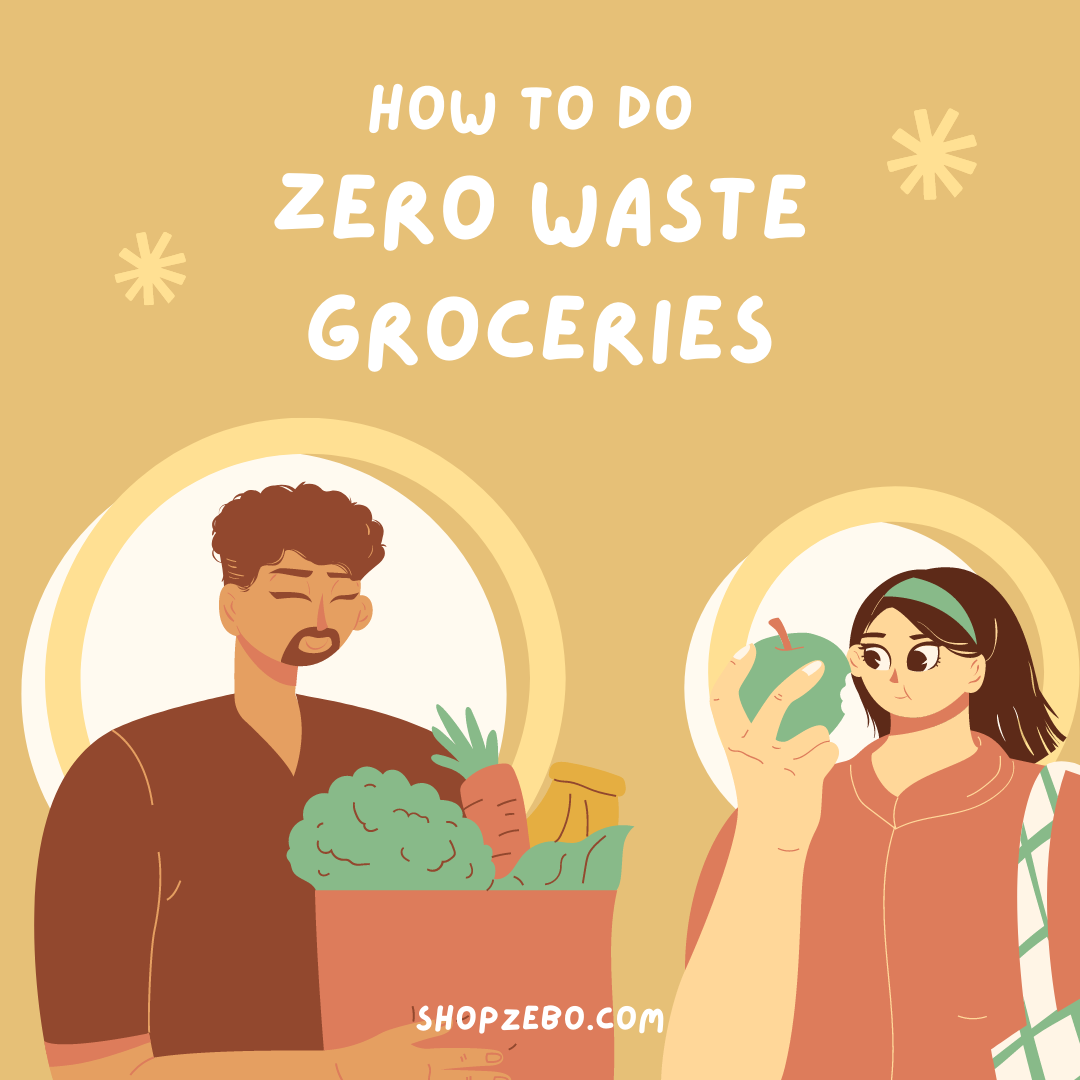September 30, 2021
I'm standing in the self-checkout line, shopping cart full. Someone just finished and left. I walk up to the register. As I'm about to start scanning loose peaches, it hit me: sh%t, I forgot to bring my canvas bags.

I love AOT.
This happened many times in my early zero waste days. I know I'm not alone in this. Zero waste (ish) grocery shopping can be a tough mountain to climb, because conventional stores literally leave you holding the (plastic) bag. But the impact can be profound: food packaging waste is a top contributor to household trash. Tackle this, and you can enjoy a lot fewer trips to the stinky, somehow always overflowing dumpster. Where to start?
Phase 1: Cut out plastic bags, like you did that toxic ex
Most of us shop at a conventional grocery store. Many of us lack convenient access to a package-free store (a 33-min car ride would sort of defeat the purpose of sustainable shopping). If that's you, do the chicken dance relax. You don't have to change your grocery shopping habits overnight. I'm a fan of conserving willpower, tweaking existing habits, and building systematic improvements from there. Stackable tricks worked for me in the early days:
- Choose paper bags over plastic when available. Ask the cashier, or search both ends of the self-checkout line.
- The Costco way, if you have a vehicle: roll your shopping cart to the parking lot and load items into your car. Unloading sucks a bit, but that'll make you remember for the next time.
- The Costco way v2: same thing, but leave sizable cardboard boxes in your car for loading and unloading. Heavy-duty cloth bags and laundry baskets work too.
- BYOBags. I nest several small bags into a big one and hang it on my front door knob. Could not forget since.
Phase 2: Fall out of love with item packaging
Relationship with plastic bags is over, sweet, you're ready to see less packaging. You know me: ease into it.
- Buy the larger size for non-perishables, if you can.
- Shop the unpackaged (I prefer the word naked) section at a conventional store. At this point you're probably used to bringing your own produce bags. I got mine from scavenging forgotten places in the apartment. A friend cut up old t-shirts to make her own.
Phase 3: Venture out. Go on dates with farmers markets, CSAs, bulk bin stores
Some conventional chains aren't plastic cesspools. Aldi and Whole Foods, for example, have plenty of package-free options. But the pandemic has complicated BYOContainer policies. Plus, don't you want to know what's out there? What if there's a better match for you? Grocery polygamy is the play.
- Shop at a local farmers market and bring your own containers. It's as simple as putting the produce into your containers, or a polite ask: "Can I buy this without the packaging? I got my own." Most will kindly accommodate and perhaps compliment you on it. If there are rubber bands or paper sleeves around the item, I remove and return them on the spot. I live in Michigan where many farmers markets are summer-only, so I explored different options in winters.
- Look up CSA, community-supported agriculture, near you on USDA or Local Harvest. This hyper-local system lets you pick up in-season harvest directly from a farm on a regular (usually weekly) basis, at an inexpensive membership cost. CSA is best for those who cook a lot, stick around enough for frequent pickups, and enjoy experimenting with kinky surprise produce. I like this balanced view on CSA pros and cons.
- Search your zipcode on this global bulk finder, or go by city on this US-specific locator. Reddit has a worldwide wiki too. If you are among the lucky ones, please leverage the sh%t out of bulk bin stores. Here's how:
-
- Grab some clean containers from home. Don't worry about the perfect-army-of-mason-jars aesthetic, you already have what you need. Jam and marinara jars, big yogurt and juice containers, glass containers, reusable takeout containers, tins, lunchboxes, travel mugs, vases (maybe not)...
-
- Plan a shopping list and match containers to it with a buffer, in terms of both size and count. Seems obvious, but I've made myself give up chocolate-covered strawberries once because I ran out of boxes.
-
- Call or check online that this store can measure the tare (empty) weight of your containers.
-
- Bring a marker, preferably erasable. When you fill up, you'll need to record the loaded weight and item number on the container for checkout.
-
- Seems like too much work? That's why my lazy ass also does this:
- Consider an ugly produce delivery box. Well-known brands include Imperfect Foods, Misfits Market, and Hungry Harvest. You'll want to look up delivery availability, delivery schedule, grocery selection, pricing, and customizability to decide if one works for you. I use Hungry Harvest and like that they minimize packaging whenever possible. Yes, the ethics may still be a little murky, as detailed by Forbes and The Atlantic, but this service is the best fit for my needs and I accept its flaws. I've done my research and prefer ugly produce over grocery stores. I encourage you to do yours.
Phase 4: Be a plant parent
Woah, we just went from dates straight to parenthood, but no one is ever quite ready, right? Again, start with hassle-free herbs and low-maintenance veggies. Then level up. Got a backyard or a balcony? Super. In an apartment? Hydroponic gardens to the rescue.
- Save roots plus a few inches of common easy-to-grow greens, like scallions, herbs, and lettuce. Put in a jar with water. They will grow with surprisingly little care.
- Reuse egg cartons as seed starters.

- I'm still a developing plant mom and won't pretend to be an expert, that's why we have YouTube. One of my favorite channels is MIgardener; the geography does bias me a bit, of course. r/VegetableGardening is a good community resource.
- Foraging is on my to-do list because Alexis Nikole makes it incredibly fun and connected to BIPOC food traditions.
Ideally, this would be the happily-ever-after for zero waste groceries. Reality is, this is a long-term relationship that takes consistent work, not a fairy tale. Expect highs and lows. Commitment is scary at first, but with a gentle system in place, it will become second nature. Ready for your turn now?

